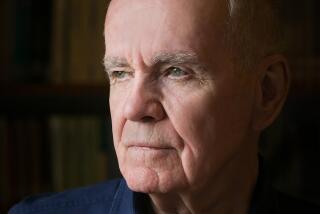Metamorphosis
- Share via
Frederic MORTON’S sharp-tongued wife, Marcia, subject of the most loving portrait in this memoir crammed with fond yet clear-eyed characterizations, frequently accused him of being a mama’s boy during (and after) their 11-year courtship. It’s true he found it much harder than his Bronx-born beloved to leave the parental nest. Explaining his reluctance at age 24 to join Marcia in her Greenwich Village half-basement, Morton writes that he needed to catch his breath “after too many abrupt metamorphoses in too few years: rich brat in Vienna to Eighth Avenue baker boy to chafing City College chem major to published novelist at an improbable age.”
Papa and Mutti were Morton’s link to his secure childhood in Vienna, where he was known as Fritz Mandelbaum. That childhood ended when the Nazis marched into Austria. His father survived Dachau, managed to get the family to the U.S. in the early 1940s and uncomplainingly endured demotion from affluent Viennese manufacturer to underpaid foreman in a Manhattan workshop, a job he could get only by Anglicizing his name. As late as 1955, 29-year-old Fred was still living in his parents’ Washington Heights apartment between jaunts to Europe to write literary profiles for the New York Times.
Each snapshot from Morton’s life -- 10 chapters capture paradigmatic incidents from 1936 to 1994 -- shows him moving into new territory while casting an anxious glance back at values and loyalties he didn’t want to abandon. (Marcia may have teased him about them, but the couple’s affectionate banter throughout shows that she understood the loyalties and shared the values.) This fruitful tension shaped his writing career as well as his character. The City College student dutifully taking “every sensible course leading to a cubicle at the National Biscuit Company” furtively wrote his first novel at the New York Public Library. His early fiction expressed a Marxist-tinged skepticism about his new homeland, whose injustices couldn’t be acknowledged by Morton’s patriotic parents, forever grateful to an “America that saved us from the Nazis.”
Yet this author with “a prole soul” would later make a living as a “jaded chronicler of a wealth-warped world” for national magazines dazzled by his “combination of Continental background and fancy prose style.” Christmas at Chateau Mouton in 1960 -- with Marcia sardonically praising their host who took her to taste caviar and then returned with her “to the old chateau in the old Rolls” -- led to his first nonfiction book, “The Rothschilds,” a bestseller in 1962 and a Tony Award-winning musical in 1971. So, naturally, he soon gave up $3,000 assignments from Holiday magazine to write political columns for the Village Voice at $130 a pop.
Papa was incredulous at this recklessness. By 1972, the elder Mortons had moved to Florida, so when Fred came to Miami to cover the Democratic National Convention, he could spend an evening listening to his father lecture him about taking a pay cut -- to attack America, no less. Mutti just wanted her son to dance with her at the Monday night senior hop. It’s typical of Morton’s fresh approach that the book’s most harrowing scene depicts neither his father’s confrontation with a brutal Nazi passport officer nor the family’s fraught train ride to the Austrian border but his 72-year-old mother’s outraged protest when she couldn’t get a waltz played because of a turf war in their retirement community. “[S]top this terrible politics all the time,” she wailed -- and she didn’t just mean wrangles between the men’s and women’s clubs over who hadn’t paid their share of the coffee dues and hence couldn’t use the jukebox.
Here as elsewhere, Morton applies fictional techniques to real-life events, revealing complex emotions through actions and sensitively analyzing motivations. This strategy yields cumulative rewards: Later chapters are almost unbearably moving, densely layered with feelings and memories stretching back decades.
The weight of those decades is evident in the final chapter, which brings Morton back to Vienna in 1994 to film a television documentary based on his novel “Crosstown Sabbath.” Marcia, who tartly skewered his neuroses on so many previous journeys, stayed home in New York; she was now “an MS quadriplegic with a diabetic complication,” he writes with deliberate bluntness. Morton acknowledges the debilities of age with the same bracing candor he displayed in his cogent glimpses of the day-to-day reality of a writer’s life.
The book closes with a typically multileveled moment, as the actor playing 11-year-old Fritz Mandelbaum turns to encounter Morton himself, a 1994 presence looking in on his 1936 self. He’s never quite left that boy behind, carrying the yearnings and fears of his Viennese youth into a decidedly American life. Although wonderfully particular in its details, “Runaway Waltz” tells a story familiar to millions who came here from somewhere else. *
More to Read
Sign up for our Book Club newsletter
Get the latest news, events and more from the Los Angeles Times Book Club, and help us get L.A. reading and talking.
You may occasionally receive promotional content from the Los Angeles Times.










